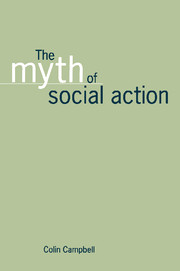Book contents
- Frontmatter
- Contents
- 1 Introduction
- 2 Action reported missing in action theory
- 3 Action and social action
- 4 Action versus social action
- 5 The rise of social situationalism
- 6 The argument by denial
- 7 Accounts and actions
- 8 The argument by exclusion
- 9 The argument through incorporation
- 10 The ‘learning everything from others’ thesis
- 11 The communicative act paradigm
- 12 The linguistic turn for the worse
- 13 The myth of social action
- 14 The obstacle which is social situationalism
- 15 Epilogue: bringing action back in
- Notes
- Bibliography
- Index
7 - Accounts and actions
Published online by Cambridge University Press: 07 May 2010
- Frontmatter
- Contents
- 1 Introduction
- 2 Action reported missing in action theory
- 3 Action and social action
- 4 Action versus social action
- 5 The rise of social situationalism
- 6 The argument by denial
- 7 Accounts and actions
- 8 The argument by exclusion
- 9 The argument through incorporation
- 10 The ‘learning everything from others’ thesis
- 11 The communicative act paradigm
- 12 The linguistic turn for the worse
- 13 The myth of social action
- 14 The obstacle which is social situationalism
- 15 Epilogue: bringing action back in
- Notes
- Bibliography
- Index
Summary
If the situationalists are correct in claiming that actions are not accompanied by any ‘mental event’ or intra-subjective process that could be said to constitute its ‘meaning’ (let alone function as its cause), then it would indeed follow that actors' accounts of their actions would not be of much value as a resource for understanding their conduct. But how then should such accounts be regarded? It is obviously consistent with the overall situationalist position to treat the giving of accounts as itself a socially situated act and thus also a form of conduct which requires understanding in situationalist terms. Hence the self-same social rules and conventions which it is believed give ordinary actions their meaning would similarly act as the source of meaningfulness for the accounts of those actions. Thus all accounts are to be treated as acts in their own right, and analysed as such: the focus being on how they are constructed and what social functions they can be said to fulfil. It is in this context that one encounters such statements as ‘words are actions too’ or Mills' insistence that the verbalisation of an act ‘is a new act’.
However, regarding an account of an action as a new act understandable primarily in terms of the social context in which it is produced rather than in terms of the action to which it refers, does leave two questions unanswered. First, some explanation is needed for the tendency of actors to refer to internal processes and states when reporting on their actions.
- Type
- Chapter
- Information
- The Myth of Social Action , pp. 63 - 83Publisher: Cambridge University PressPrint publication year: 1996



